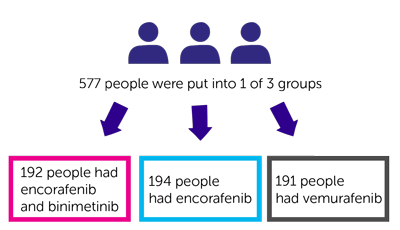A trial of encorafenib, binimetinib and vemurafenib for melanoma (COLUMBUS)
Cancer type:
Status:
Phase:
This trial compared 2 drugs called encorafenib and binimetinib with vemurafenib for melanoma skin cancer.
This trial was for people with melanoma skin cancer that had spread to nearby  or to another part of the body (advanced melanoma). And whose melanoma cells had a change in the gene called BRAF.
or to another part of the body (advanced melanoma). And whose melanoma cells had a change in the gene called BRAF.
More about this trial
- encorafenib with binimetinib
- encorafenib on its own
- which was the best for treating people with advanced melanoma
- more about the side effects of encorafenib and binimetinib
- what happened to encorafenib and binimetinib in the body
Summary of results
- 192 people had encorafenib and binimetinib
- 194 people had encorafenib
- 191 people had vemurafenib
- 121 people (63%) in the encorafenib and binimetinib group
- 98 people (51%) in the encorafenib group
- 77 people (40%) in the vemurafenib group
- 15 people (8%) in the encorafenib and binimetinib group
- 10 people (5%) in the encorafenib group
- 11 people (6%) in the vemurafenib group
- 106 people (55%) in the encorafenib and binimetinib group
- 88 people (45%) in the encorafenib group
- 66 people (35%) in the vemurafenib group
- 56 people (29%) in the encorafenib and binimetinib group
- 65 people (34%) in the encorafenib group
- 79 people (41%) in the vemurafenib group
- just under 15 months (14.9 months) for people in the encorafenib and binimetinib group
- just over 9½ months (9.6 months) for people in the encorafenib group
- just under 7½ months (7.3 months) for people in the vemurafenib group
- 66 people (34%) in the encorafenib and binimetinib group
- 65 people (34%) in the encorafenib group
- 69 people (37%) in the vemurafenib group
- feeling and being sick
- diarrhoea
- tiredness
- aching muscles
- an increase in the amount of creatinine in the blood
- constipation
- headache
- weakness
- dry skin
- rash
- high temperature
- an increase of an enzyme called GGT
- hair loss
- loss of muscle strength
- high blood pressure
- feeling and being sick
- tiredness
- aching muscles
- headache
- dry skin
- rash
- hair loss
- darkening of the skin
- loss of muscle strength
- pain, tingling and numbness in the hands and feet
- diarrhoea
- high temperature
- an increase in an enzyme called GGT
- thickening of the skin on the soles of the feet and palms of the hands
 ) and published in a medical journal. The figures we quote above were provided by the trial team who did the research. We have not analysed the data ourselves.
) and published in a medical journal. The figures we quote above were provided by the trial team who did the research. We have not analysed the data ourselves.Recruitment start:
Recruitment end:
How to join a clinical trial
Please note: In order to join a trial you will need to discuss it with your doctor, unless otherwise specified.
Chief Investigator
Dr Mark Middleton
Supported by
Array Biopharma Inc
Experimental Cancer Medicine Centre (ECMC)
NIHR Clinical Research Network: Cancer
Novartis
If you have questions about the trial please contact our cancer information nurses
Freephone 0808 800 4040






